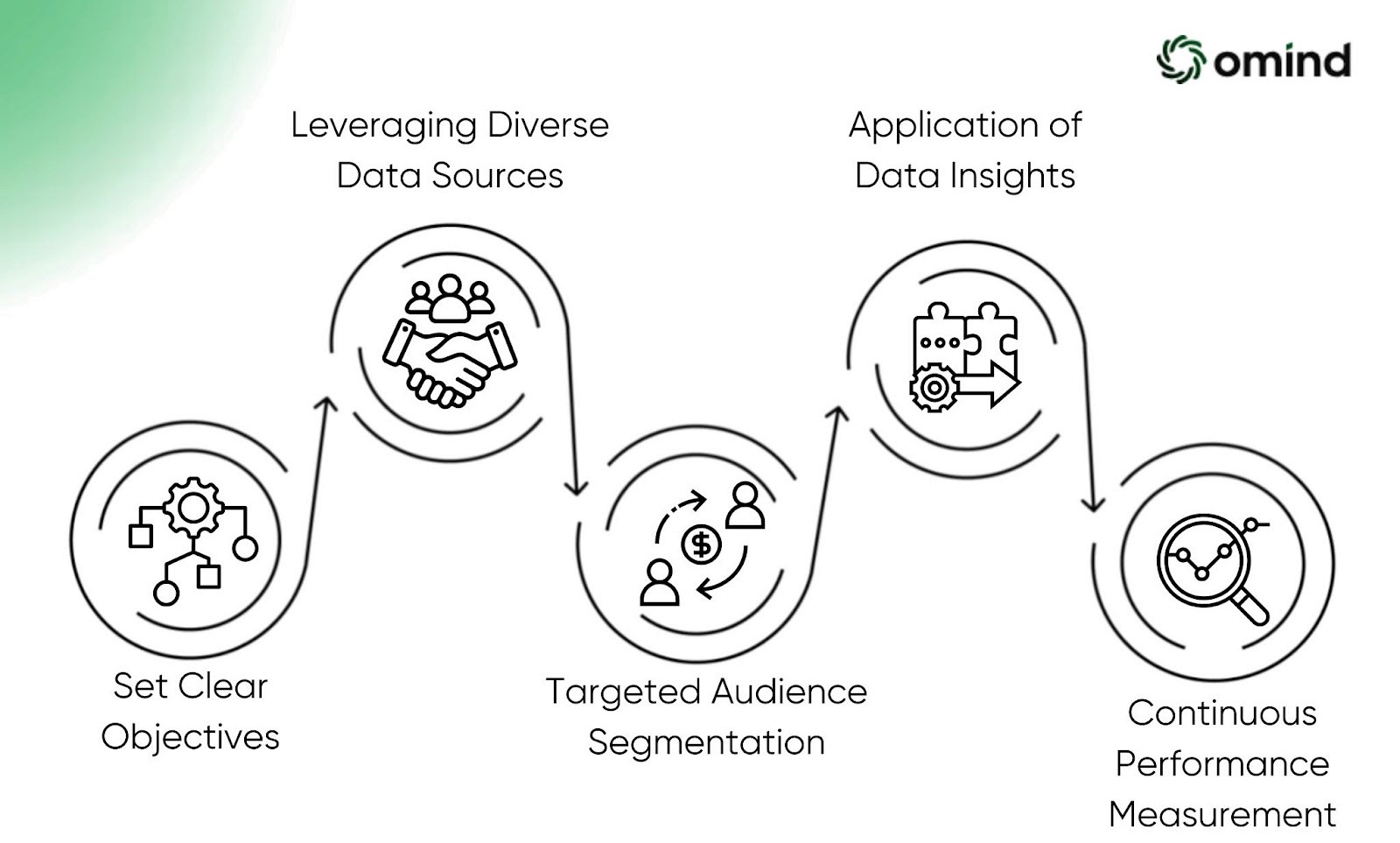Data-based marketing makes customer experiences personal. How does this help you improve your business? In today's world, data-based marketing is an essential component of success. This strategy assists companies in shifting from traditional methods to analytics-driven strategies. This method provides valuable insights into customer behavior, preferences, and trends.
These insights help in decision-making, allowing businesses to tailor their marketing efforts more accurately. Data is vital to delving deep into clients' tastes and preferences. It is also a basic part of data-driven marketing plans, which are necessary to move with the trends. Through advanced analytics, you can discover patterns and hidden opportunities.
Client expectations are getting tougher. So, understanding their hearts and offering a customer-centric approach is essential to keeping up with the trend. Customers expect personalized experiences and relevant brand interactions in today's digital age. The data you get will help you meet these expectations by delivering targeted messaging and recommendations. The data allows companies to enhance customer satisfaction and achieve sustainable growth in a competitive landscape.
Now, let's dive into the core strategies that make data-based marketing a game-changer for businesses today.
Core Strategies for Success in Data-Driven Marketing

Set Clear Objectives: To maximize the effectiveness of data-driven marketing, it is crucial to set clear goals. These goals guide you and ensure that every effort aligns with the main business objectives. Regularly reviewing and revising these goals is essential for staying agile and adaptive.
Leveraging Diverse Data Sources: Getting diverse sources of data is vital for your marketing effort. Businesses get insights into customer behavior, preferences, and trends by getting data from various streams. Moreover, you should integrate both structured and unstructured data sources. They help you get a holistic understanding of customer interactions and sentiment.
Integrating and analyzing diverse data can be complex. Partnering with Omind could streamline this process, leveraging their generative AI to better understand your customers' interactions and sentiments.
Targeted Audience Segmentation: Analyzing consumer data allows for a separate audience and tailored and personalized marketing campaigns. Now, companies can understand different customer segments' unique wants and preferences. This will help you give relevant messaging and offers to a particular group. Additionally, getting advanced techniques such as behavioral and demographic enhances marketing effectiveness.
Application of Data Insights: The insights extracted from data analysis are the basis for your marketing efforts. Using these insights, businesses can fine-tune strategies to boost impact and ROI. Moreover, using analytics to forecast future trends empowers with choices and campaign planning.
Continuous Performance Measurement: Measuring campaign performance is vital for refining and improving data-driven marketing strategies. By monitoring key metrics and KPIs, businesses can spot areas for improvement and ensure maximum results. Additionally, conducting A/B testing and multivariate analysis will help continuous improvement.
Have you navigated the how? Now, let's peek at the wow—the transformative benefits that data-driven marketing brings to the table.
Benefits of Embracing Data-Driven Marketing
1. Personalization and Targeting
Data-based marketing is one of the best ways to connect with individual consumer profiles. By employing insights from data analysis, you can tailor messages and offer specific needs and preferences of their target audience.
Additionally, real-time data monitoring ensures campaigns stay relevant and practical.
Omind's experience management platform can offer real-time data monitoring and analysis for businesses seeking to enhance personalization and targeting, enabling campaigns to stay relevant and highly effective.
2. Efficiency in Marketing Spend
Efficiency in Marketing Spend Data-driven marketing allows for the efficient allocation of resources to high-conversion tactics.
By analyzing the performance of different marketing platforms and tactics, businesses can identify the most effective approaches and optimize their marketing spend, maximizing ROI.
Furthermore, predictive analytics can help forecast future trends, enabling proactive investment choices.
3. Enhanced Customer Experience
One key benefit of data-based marketing is the ability to offer relevant content that fits the audience. Knowing customer preferences will help you create personalized experiences that delight consumers.
In this way, you can develop each customer's satisfaction and loyalty. Moreover, data from omnichannel marketing ensures a consistent experience across all interactions.
4. Better ROI and Competitive Advantage
Data can help businesses surpass competitors and achieve better returns. Data-based insights allow you to optimize campaigns and improve targeting accuracy.
They are also helpful in making discoveries and driving competitive advantage in the marketplace. You also get clarity on marketing activities, decision-making, and resource allocation.
5. Insights for Product Development and Demand Creation
Data-based marketing is helpful for strategies and leads product development and demand creation. By analyzing market trends, industries can spot their customers' emerging needs and preferences.
Furthermore, using customer feedback data allows product improvements and promotes innovation.
We've seen the shiny side, but let's get real and tackle some challenges and their clever solutions.
Problems and Solutions for Data-Driven Marketing

Privacy and Personalisation: A business must ensure data security while using data-driven marketing. It is possible to achieve these two areas with open data-collecting procedures. You can offer obvious opt-in/opt-out options and provide data encryption and safe storage procedures. Personalized marketing is also possible while protecting individual privacy rights by enhancing technology.
Beyond Problems with Data Quality: Data quality is another problem you face when you seek accurate decision-making. Investing in strong technology may help you solve this problem to the maximum extent. Furthermore, long-term success depends on creating a data-driven culture that values the integrity and quality of the data.
Handling Data Silos: Because of several departments and systems, data silos make data-based marketing less successful. But, solving this with data integration allows smooth data sharing and cooperation. Additionally, cross-functional collaboration and communication should be encouraged to avoid these issues.
Retaining Data Regulation Compliance: Maintaining strict data laws like GDPR and CCPA is a major problem when dealing with data-based marketing. It is important to follow data privacy rules and policies to avoid problems. Technology solutions from Omind can also reduce privacy concerns and follow rules without losing data. Furthermore, proper staff training will help you protect customer data and privacy rights.
Ready to roll up your sleeves? Here's how you can implement all this knowledge and lead a successful data-driven marketing campaign.
Implementing a Data-Driven Marketing Strategy
Understanding your audience with analytical insights drives the success of your customer experience. Data analytics tools and techniques can help businesses gain valuable insights into customer behavior and preferences. They will help you create targeted, personalized marketing campaigns that delight your audience.
It is important to utilize all available data sources for comprehensive ad targeting. Businesses can build a holistic view of their customers by integrating data such as CRM systems and social media platforms. This will help you develop advertising campaigns that reach the right audience at the right time. Utilizing Omind's platform can assist in harnessing all available data sources for comprehensive ad targeting and crafting personalized customer journeys that resonate with every segment of your audience.
Segmenting email lists and personalizing website experiences based on customer data are critical methods in data-driven marketing. By separating email lists according to customer preferences, you can deliver more engaging content to users. Similarly, personalizing a website on customer data allows businesses to deliver tailored messaging.
When adopting a strategy, it's crucial to ensure your tactics follow legal requirements for data use. Businesses must adhere to regulations such as GDPR and CCPA. They will control the collection, processing, and storage of customer data. With data privacy policies and obtaining customer consent, companies can mitigate the risk of legal action. This also helps them maintain trust with consumers.
Hang in there; we're about to explore how emerging trends in data-driven marketing are reshaping the landscape and what this means for the future. Let's dive deep, shall we?
Emerging Trends in Data-Driven Marketing

Privacy data are changing, so there is a noticeable shift towards using first-party data. Businesses are now focusing more on customer data to fuel their marketing strategies. This approach ensures compliance with changing privacy regulations and enhances targeting and personalization.
Integrating AI and automation tools is becoming more common in data-based marketing strategies. These technologies allow you to automate repetitive tasks and analyze vast data. Marketers can use AI-powered insights to look for accuracy and optimize real-time campaign success.
The consumer journey is becoming fragmented, with consumers engaging with brands across multiple touchpoints and devices. To stay ahead, companies are adapting diverse marketing strategies to accommodate this complexity. It adopts omnichannel marketing strategies and uses advanced analytics to track customer interactions across various platforms. This will ensure a seamless and cohesive experience throughout the customer journey.
And now, after a deep dive into data-driven marketing, let's wrap things up and envision how this will shape the road ahead.
Conclusion
Data-based marketing is becoming more relevant in offering a personalized approach. This also aids you in navigating the complexities of modern marketing landscapes. Businesses that use data-driven strategies gain a competitive edge in today's world. The data lets you know the audience, personalize experiences, and optimize marketing efforts for better ROI.
Moreover, adaptation and investment in data skills are crucial for today's evolving market. A company must remain agile and accept new technologies and insights to stay ahead of the curve. These skills are vital to meeting your customer's ever-changing needs and expectations.
With Omind's expertise in generative AI, you can offer a complete solution for your businesses. The company helps you with data-driven marketing and assists you with personalized suggestions. Plan a trial with Omind today to know the full potential of our data-driven strategies. Start your journey towards marketing success and enhance customer experiences.
AUTHOR
Team Omind
Empowering Businesses with Unified Customer Experience Platform, Leveraging Advanced AI and Intelligent Automation
PRODUCT
Marketing AI
Share LINK
Related Blogs




